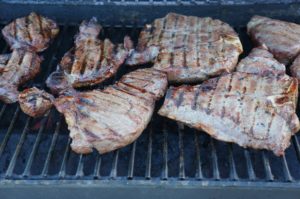
It seems the latest diet craze I have been hearing about is the vegetarian/vegan way of eating where only plant foods are consumed. If done correctly, this way of eating can meet your nutrient needs, however it does take diligence and effort as animal foods do have excellent vitamins and minerals and especially protein to offer our body…. and we would be missing out on them if not consumed. This latest trend made me feel it was time to discuss proteins again on the blog. Let’s get back to the basics!
What is a Protein?
Proteins are the basic building blocks of the human body. They are made up of amino acids, and help build muscles, blood, skin, hair, nails and internal organs. Next to water, protein is the most plentiful substance in the body, and most of it (around 60% to 70%) is located in the skeletal muscles. Protein provides 4 calories per gram and is found in foods like meat, fish, poultry, eggs, dairy products, beans, nuts, and tofu.
What do proteins do?
- Supplies valuable enzymes that regulate bodily functions
- Provide for the transport of nutrients, oxygen and waste throughout the body.
- Key to muscle building and development
- Provide the structure and contracting capability of muscles.
- Provide collagen to connective tissues of the body and to the tissues of the skin, hair and nails.
What happens if I eat too many proteins?
A diet containing excess protein can have the following adverse effects:
- May put your other bodily systems under stress.
- Eating more protein and increasing total caloric intake while maintaining the same exercise level will build an equal amount of additional fat and muscle mass,
- Ketogenic diets can thrust your kidneys into overdrive in order to flush these ketones from your body. As your kidneys rid your body of these toxic ketones, you can lose a significant amount of water, which puts you at risk of dehydration, particularly if you exercise heavily
What happens if I eat too little proteins?
- An insufficient supply of protein the diet limits the amount of protein your body can use for daily cell function and building muscle.
How do proteins aid in weight loss?
- High-protein foods slow the movement of food from the stomach to the intestine. Slower stomach emptying means you feel full for longer and get hungrier later.
- Protein’s gentle, steady effect on blood sugar avoids the quick, steep rise in blood sugar and just as quick hunger-bell-ringing fall that occurs after eating a rapidly digested carbohydrate, like white bread or baked potato.
- The body uses more energy to digest protein than it does to digest fat or carbohydrate
What are the types of proteins to eat?
- Animal proteins – include meat, poultry, fish, dairy products and eggs and are of high biological value. These foods contain all the essential amino acids your body requires.
- Vegetable, Grain, Legume, Seed or Nut proteins – these are considered incomplete proteins, since each individual food does not contain all of the essential amino acids. To get all of the essential amino acids, simply choose foods from two or more sources.
If you have any questions about this topic, feel free to email me!
Kelsey Raml, MS, RD, LN
strive2survive@brownclinic.org

